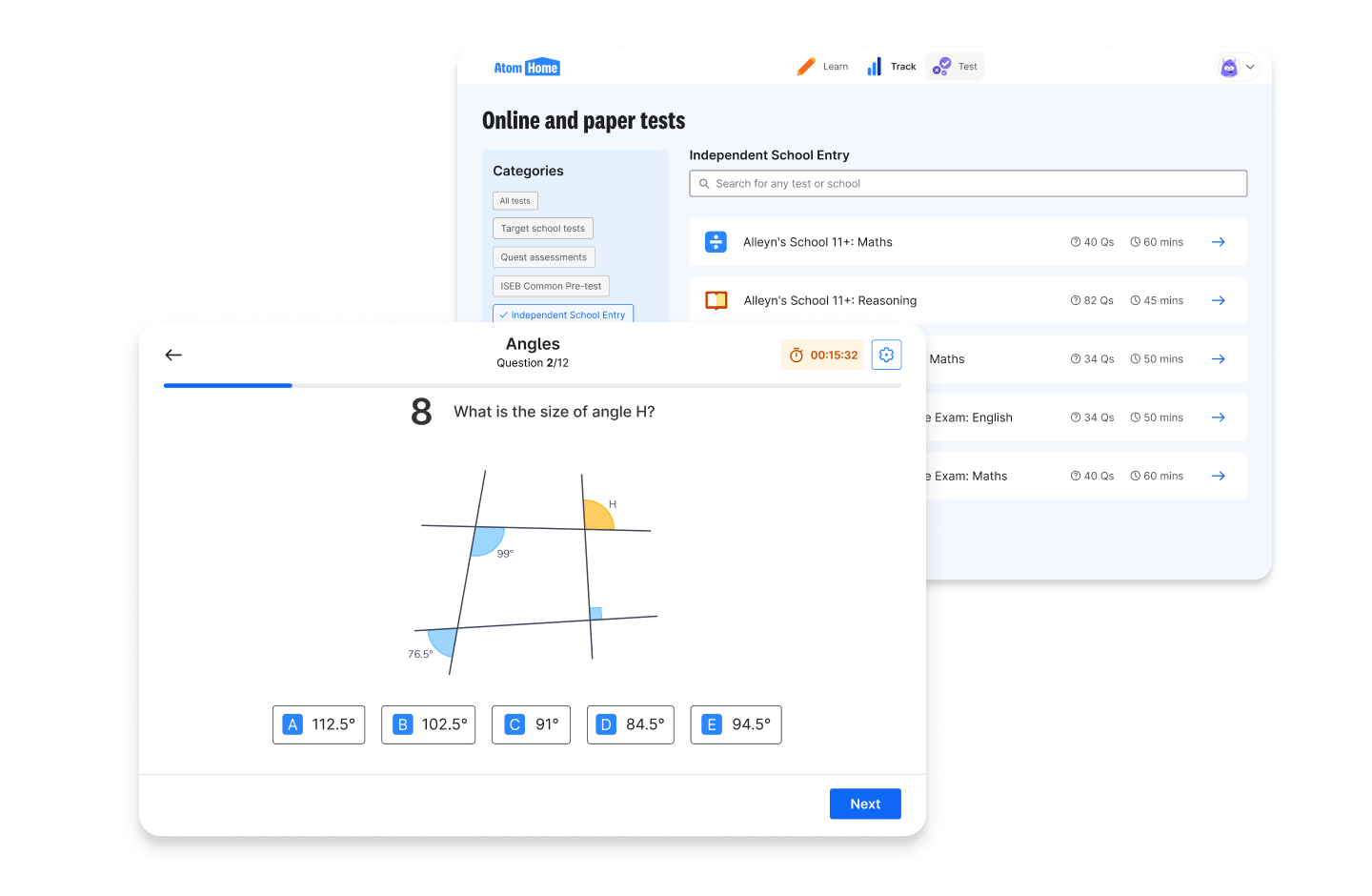Guide to senior school interviews

Is your child applying to an independent school? They might be invited to a school interview as part of the admissions process.
Keep reading to:
- Learn why private schools use interviews
- See examples of questions your child might be asked
- Get tips to help your child prepare for their interview
- Download a free resource to help your child feel confident and ready!
Why do schools interview candidates?
Lots of private schools include an interview as part of their entry process. This can seem like a daunting extra step, but it's a useful part of the process for the school, for you, and for your child.
An interview can provide a more holistic insight into your child's abilities and interests than test scores. Your child's interviewer will be looking for qualities such as:
- An interest in learning for the sake of learning
- A passion for interests outside of academic subjects
- A willingness to be part of a community
- General good communication skills and, of course, good manners!
How you and your child feel about their interview can also help you make a decision about the school. If your child didn't enjoy the experience, you might decide that the school isn't the right fit for them.
£100 off your Atom Home subscription
You have the chance to win £100 off your Atom Home subscription when you sign up to our newsletter.

What questions do they ask at private school interviews?
Most schools put a lot of effort into making the interview process engaging for your child. It's in the school's best interests for your child to enjoy their experience. While the offer of a place isn't in your control, it's up to you to decide whether to accept or reject an offer.
Admissions interviews often include practical elements, such as creative tasks and show and tell, to make the experience enjoyable.
Academic questions
In addition to the main entrance exam, some interviews include a short academic task. This might be used to assess your child's skills in areas such as verbal communication or mental maths.
Your child might be asked to read a piece of unseen material – such as an excerpt from a short story, a poem, or a news story. The interviewer will ask them some questions to test their understanding of the text and probe them to think analytically.
They might also have a real-life scenario in which they will need to use mental maths to solve a problem. For example, they might need to work out the discount when buying promotional items in a theoretical shop.
How to prepare for academic questions
The best way to prepare for these types of tasks is to build skills into your child's everyday routine. Help them develop critical thinking and analysis skills by reading current affairs together. We recommend CBBC Newsround as a wonderful child-friendly (and free!) resource. Ask your child to choose an article that interests them and discuss it together:
- What were the main facts?
- Does the author have an opinion about the subject?
- What is your child's opinion of the subject?
It can also help to get your child involved in activities around the house. Cooking and baking together, and getting them involved in the family food shop, can help them develop mental maths skills. For more ideas, take a look at our top tips for helping your child with maths at home.
Extracurricular questions
Independent schools often invest a lot of money in their facilities and extracurricular activities. Pupils are expected to make the most of these opportunities.
In the interview, your child will likely be asked about what they enjoy doing in their free time. The interviewer will be looking for evidence that your child is willing to get involved in the extracurricular programme. They might also want to see if they have any particular talents that the school can support and develop. Asking your child about their interests is also a great way to get them to open up and feel confident. Most children aged 10–11 enjoy talking about themselves and their interests!
How to prepare for extracurricular questions
It doesn't matter what your child's hobby is. The main thing is that your child has an interest, or interests, beyond their school life. However, it can help if their interest aligns with an extracurricular activity the school already has on offer.
Do your research before the interview. Is your child an amateur violinist? Encourage them to express their interest in joining the school string orchestra. Are they a budding artist? See if there are any art workshops or clubs they could attend.
Show and tell
Some schools ask candidates to take an object to their interview. The admissions team will let you know if this is something your child needs to do.
In most cases, the object can be anything your child likes. Some options include a piece of schoolwork they're proud of, something related to one of their extracurricular activities, or an object of sentimental value. It doesn't usually matter what the object is – just that your child can talk about it and answer questions.
How to prepare for show and tell questions
Practise typical questions and answers with your child at home ahead of time. If your child’s favourite object is a particular book, ask them to describe the main characters and how they might have ended the book differently. Have they chosen a piece of schoolwork? Ask them to talk about the process behind the work and the skills they developed along the way.
Free resource: school interview handbook
Help your child feel confident for their admissions interview with this free printable handbook. Includes examples of typical questions, practical tasks and top tips!
What are the most common private school interview questions?
Here are some of the most common questions your child might be asked in their interview. No matter what question your child is asked, they should consider specific examples to help them structure their answers.
- What is your favourite subject and why?
- What is your least favourite subject and why?
- What accomplishment (or personal achievement) are you most proud of?
- What extracurricular activities are you interested in?
- What do you like to do in your free time?
- What are your strengths?
- What are your weaknesses?
- How do you contribute to your community?
- What book are you currently reading, or what is the last book you read?
- Do you have any questions about our school?
Top tips for private school interviews
Practise communication skills
As with any interview, politeness and manners are a must. The school will be looking for children who are well-behaved, can get on with others, and will be a pleasure to teach. Your child should treat the interviewer as they would a teacher or a friend's parent. Saying please and thank you, and remembering to shake hands, can help create a positive first impression.
It's natural to feel nervous about the interview (particularly at 10 years old) and the interviewer will expect this. However, it's important that your child engages with their questions. The interviewer needs to get detailed answers from your child to learn more about them and decide whether the school would be the right fit for them.
Pay attention to presentation
First impressions are important. How your child presents themselves will play a part in the interviewer's decision.
Body language is key. Your child should remember to make eye contact, sit upright, and avoid fidgeting. Positive body language indicates confidence (even if your child isn't feeling very confident) and shows that they're alert and interested. This is a good indication that your child will behave well in the classroom.
Most school interviews don't have a dress code. If your child does need to wear their current uniform, you'll be told in advance. However, even if they can wear their 'normal' clothes, choose their outfit wisely. Smart, clean clothes, washed and brushed hair, and non-scruffy shoes help to make a good first impression.
Prepare questions for the interviewer
At the end of the interview, the interviewer might ask your child if they have any questions.
This is a great opportunity for your child to find out more details about the school. The interviewer will also be looking to see if your child is excited about what the school has to offer. Children who demonstrate an interest in the school by asking questions are more likely to be engaged and active in school life. These are the sorts of children schools are usually looking for!
Before the interview, go through the school website and marketing materials with your child. Let them navigate and flick to pages that interest them most. If there's something about school life that interests them, or if they can't find something they're looking for, they can ask the interviewer for more information.
Read regularly and widely
It's vital your child keeps reading. Their reading material should be varied, age-appropriate, and cover material beyond school-assigned reading. The school won't expect your child to have read all of Shakespeare, but making sure they've read some classic children's books is a good start.
Make sure your child is up to date with current affairs too. We recommend supervised reading of the news and of child-friendly journalism, such as The Week Junior. Engage your child in discussions about the news. Be prepared to explain what's happening and encourage your child to draw their own conclusions.
Looking for reading inspiration? Check out our Key Stage 2 reading list.
Interview FAQs
Find answers to some frequently asked questions about school interviews.
When will my child be interviewed?
The timing of your child’s interview will depend on the school admissions process.
Some schools only interview shortlisted children. These are children who have performed well in the entrance exam. If your child is shortlisted, they might be interviewed in January in the year of entry.
Other schools interview all candidates to try and create a fair and personable experience. If your child's target school interviews everyone who applies, the interview might be held any time from November to January.
Who will interview my child?
If your child is applying to a small school, they might be interviewed by the head themselves. In larger schools, it's more common to be interviewed by a senior member of staff (e.g. a deputy headteacher, or head of Year 7) or an admissions officer.
How long does the interview last?
Private school interviews usually last around 15–20 minutes.
Will I also be interviewed with my child?
It's not common for parents to be interviewed as part of the school admissions process.
However, there are some exceptions. If you're applying to a faith school or a school that has a particularly family-orientated ethos, you might have a parent interview. This is usually to see whether your values align with the school's, and to make sure that you'll support its aims and ethos.
Take control of your child’s independent school prep.

Worried about keeping pace with the competition? Independent school exams can feel unpredictable, but your child’s preparation doesn’t have to be. Atom shows you exactly what to practise and how they’re performing, so you can stay ahead throughout the admissions process.
- Follow personalised weekly exam plans that show them what to learn next.
- Practise with mock tests that replicate their exam and generate new questions every time, so they build real exam skills.
- Track progress and see how they compare to others preparing for the same schools.
Start your free trial and help your child get ready for senior school entry.




